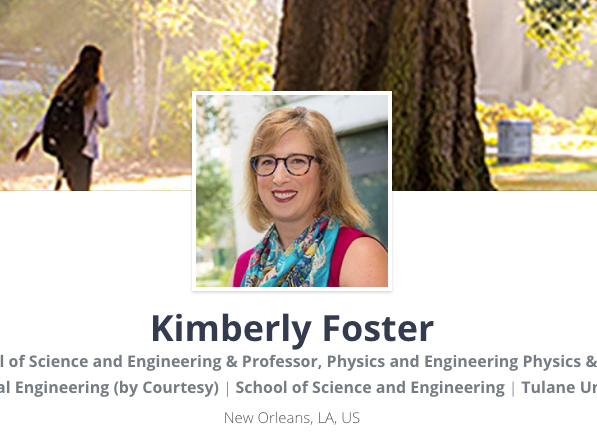Kimberly Foster
Dean, School of Science and Engineering & Professor, Physics and Engineering Physics & Professor, Biomedical Engineering (by Courtesy)

Biography
Kimberly Foster (formerly Turner) became the new Dean of the Tulane University School of Science and Engineering on August 1, 2018. Foster grew up in the Upper Peninsula of Michigan, receiving her Bachelor of Science degree in Mechanical Engineering from Michigan Technological University in 1994. She then studied Theoretical & Applied Mechanics at Cornell University, receiving a PhD in 1999.
While at Cornell, she became fascinated by the “very small” and spent most of her time there building and inventing methods of characterizing microelectromechanical devices. Following her PhD, she moved to UC Santa Barbara, where as an assistant professor, she began a laboratory effort focused on understanding and exploiting nonlinear dynamics for a wide range of microscale sensors. She became Associate Professor in 2004, and Full Professor in 2008. She served as Vice Chair of the mechanical engineering department from 2006-2008 and department Chair from 2008-2013. She also co-Chaired UCSB’s BRAIN Initiative, and until her departure from UCSB in 2018, was Associate Director of the Center for Bioengineering at UCSB. She was the Sensors Task order Leader for the UCSB-MIT-Caltech ARMY Institute for Collaborative Biotechnology from 2004-2009.
Kimberly Foster’s current scholarly research interests include nonlinear microelectromechanical systems, micro/nanoscale mechanics and biomedical technology development. As a leader, she is committed to and passionate about interdisciplinary research and education for scientists and engineers, and on the continued evolution of engineering and science education at all levels.
Education
Cornell University
Michigan Technological University
Articles
Influence of Humidity on Grip and Release Adhesion Mechanisms for Gecko-Inspired Microfibrillar Surfaces
2017
Geckos have developed foot pads that allow them to maintain their unique climbing ability despite vast differences of surfaces and environments, from dry desert to humid rainforest. Likewise, successful gecko-inspired mimics should exhibit adhesive and frictional performance across a similarly diverse range of climates. In this work, we focus on the effect of relative humidity (RH) on the “frictional-adhesion” behavior of gecko-inspired adhesive pads.
Tailoring the nonlinear response of MEMS resonators using shape optimization editors-pick
2017
We demonstrate systematic control of mechanical nonlinearities in micro-electromechanical (MEMS) resonators using shape optimization methods. This approach generates beams with non-uniform profiles, which have nonlinearities and frequencies that differ from uniform beams. A set of bridge-type microbeams with selected variable profiles that directly affect the nonlinear characteristics of in-plane vibrations was designed and characterized. Experimental results have demonstrated that these shape changes result in more than a three-fold increase and a two-fold reduction in the Duffing nonlinearity due to resonator mid-line stretching. The manipulation of this nonlinearity has significant interest in many applications, including precise mass sensing, accurate measurement of angular rates, and timekeeping.
Enhancement in CMOS-MEMS Resonator for High Sensitive Temperature Sensing
2016
This paper presents the enhancement in frequency shift per Celsius for high-temperature sensitive applications of microresonators. Using materials with different coefficients of thermal expansion in a substrate and beam, larger axial load on fixed ends are demonstrated. This results in a larger frequency shift with the increase in the ambient temperature. An analytical model is presented that closely matches simulation and measurement results. The 120-μm CMOS-MEMS fixed-fixed beam resonators, consisting of multiple metal, dielectric layers, and polysilicon layer, were designed and measured with a center frequency around 640 kHz. A sensitivity up to -2983 Hz/°C is achieved without sacrificing stiffness constant.
Media Appearances
People this Week: New hires, promotions, awards
Einstein Charter Schools has announced the appointment of Andre Harris as principal at Einstein Charter Middle School.
Kimberly Foster has become the new dean of the Tulane University School of Science and Engineering.
The Board of Einstein Charter Schools has announced that Daniel Davis has been appointed interim CEO. He succeeds former CEO Shawn Toranto, who retired.
Tulane hires new dean for School of Science and Engineering
Tulane University has hired Kimberly Foster, a mechanical engineering professor from the University of California at Santa Barbara, as the new dean of the School of Science and Engineering. A university news release stated her first day is August 1.
Tulane Today Mentions
Tulane selected for one of three $27 million U.S.-Israel Energy Centers
Tulane study seeks new insights into panic disorder and post-traumatic stress disorder
Tulane scientists to share in $20 million NSF award for materials research
Race for COVID-19 tests, treatments, vaccine subject of Tulane Innovation series
Three Tulanians honored with STEM awards



